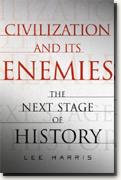Lee Harris
book reviews:
· general fiction
· chick lit/romance
· sci-fi/fantasy
· graphic novels
· nonfiction
· audio books
· author interviews
· children's books @
curledupkids.com
· DVD reviews @
curledupdvd.com
newsletter
win books
buy online
links
home
for authors
& publishers
for reviewers

 |
Civilization and Its Enemies: The Next Stage of History Lee Harris Free Press Hardcover 256 pages February 2004 |
|
Civilization and Its Enemies (CIE) by mystery writer turned cultural theorist Lee Harris contains some of the most disturbing (and racist) political rhetoric to reach reach a mass audience since Mein Kampf.
Harris says that the U.S. is the "sole source of global legitimacy" which benefits from a necessary "double-standard with respect to violence." He claims that the U.S. should, more or less, rule the world through military dominance. He says that this is in everybody's best interest because "the U.S. is a practical...utopia that works," and if some, or even the majority, of people in the world don't like it, then too bad. It's something they're just going to have to "learn to live with." Harris's vague, emotional arguments often parallell those presented by Hitler in Mein Kampf. The only differences between the two are that Hitler was anti-Semitic and claimed racial superiority, where Harris is anti-Arab and claims cultural superiority. Hitler argued that civilization depended on the Aryan race and that other races, specifically the Jews, were set on undermining civilized life. Harris argues that civilization is dependent on the United States and that Arabs, a savage race, are bent on destroying it. He claims that "to avoid returning to a Hobbsian world where life is nasty, brutish, and short," the U.S. must, "bring the Islamic world back to sanity." As Hitler said Jews were lazy, Harris states, "If we look at the source of Arab wealth, we find nothing that the Arabs created for themselves." They were just lucky, he asserts, born to a land rich with valuable oil. Harris develops the concept of fantasy ideology -- basically any ideology other than American conservativism. Fantasy ideologies, according to Harris, have no basis in reality and cause believers to wage senseless wars. Fascism is a fantasy ideology. Socialism and Communism, too. Harris does not specifically identify exactly what the Arab "fantasy ideology" consists of, he just vaguely states that terrorists are living out a sort of David-and-Goliath fantasy about destroying the U.S. and that "there is absolutely no political policy that we [the U.S.] could adopt that would change the attitudes of our enemies." U.S. military and financial support to Israel and the U.S. military presence in Saudi Arabia (both stated by Osama bin Laden as reasons for the 9/11 attacks) have nothing to do with anti-U.S. sentiment in the Middle East, according to Harris. The Arabs are just crazy. For them "to watch an American city go up in a fireball is its own reward." After scapegoating the "collective fantasy world of Islam" for the "collapse of the well-ordered liberal system," Harris goes on to attack the American Left for its preference to multinationalism over U.S. global hegemony. He says that "the Left-wing intellectual seems to have contempt for everyting that the average American holds dear," the left has "degenerated" and is becoming "dangerously close to a full-fledged fantasy ideology" and "outright enemy" of the U.S. government. Like Mein Kampf, CIE is poorly written and argued. Vague emotional arguments and redundancies strip the book of any pretext of academic integrity, leaving nothing but the pedantic, intellectualized rants of an angry, narrow-minded Southern man. Though Harris's analysis of Spartan warrior society is somewhat original and interesting, the warped purpose he applies it to in his book makes it all but impossible to appreciate. Harris's book is, in fact, one giant redundancy. All of Harris's statements about fantasy ideologies could be easily applied to his own philosophy: "The logic behind this fanaticism is childly transparent: The world does not live up to my ideals of it. Therefore, it must be changed to fit these ideals...by any means necessary."Let us hope that history does not require hindsight to realize the danger of this sort of thinking. It allowed an angry little moustached man to whip an intellegent and reasonable country into a war-hungry frenzy. It started World War II. It would be a shame, and a sad statement on our intelligence as a society, if we were to allow it help narrow-minded men like Harris cause a third World War only half a century later. © 2004 by Matt Gibson for Curled Up With a Good Book |
|
|
|
 Click here to learn more about this month's sponsor! |
|
| fiction · sf/f · comic books · nonfiction · audio newsletter · free book contest · buy books online review index · links · · authors & publishers reviewers |
|
| site by ELBO Computing Resources, Inc. | |
 CIE is basically a poor psuedo-Foucaultian analysis of the history of war and
weak intellectual justification for the Bush administration's dangerously
aggressive post-9/11 foreign policy.
CIE is basically a poor psuedo-Foucaultian analysis of the history of war and
weak intellectual justification for the Bush administration's dangerously
aggressive post-9/11 foreign policy.